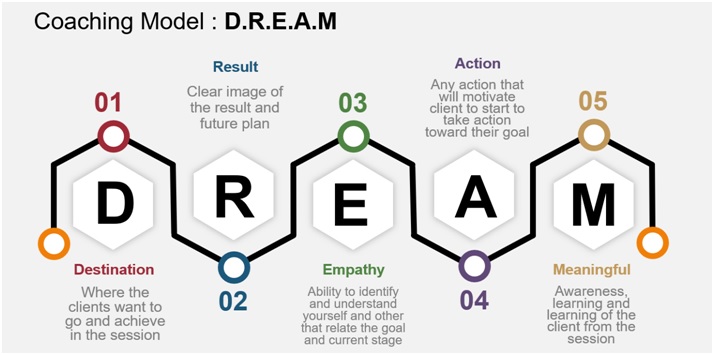A Coaching Model Created by Samanjit Seely
(Leadership Coach, THAILAND)
Introduction
After working in the MICE industry for almost 10 years, I felt busy with my works all the time. One day I asked myself, “What value can I do for others?” “What do I want to do?” “Can I do something different and have a big impact on others?”These questions motivated me to challenge myself and start to shift my field from the hospitality industry to start up business and to lead to the Organizational Development consultant as where I am now today. The thought-provoking questions motivated me to do something different. I found that if I have a clear goal, I can find my way to achieve it, and these questions could make a big impact on others too.
Coaching Model Influence:
Every day in their organization, many leaders are busy with the business they have to develop and the work that needs to be done. They have deadlines and many things that they have to take care of effectively. All the leaders and top management in the organization may forget something they used to dream of. They forget what they wanted to be and wanted to do to create something different. The answer is to help top management and leaders in the organization bring back their dreams and their own goal.
The coaching model DREAM
D – Destination
The destination is the place where someone is going or where something is being sent or taken. This is the foundation stage to help clients explore the direction and destination that they might have been thinking about, but never speak it out loud or never have a chance to talk about it.
- What do you want to do?
- What is the thing that you want to create but never have a chance to do it?
- What dreams do you want to achieve, and what goals do you want to accomplish?
These are simple questions that I ask any top management in an organization that is caught up in the things he has to do but forgets to ask himself about something he wants to do.
R – Result
The result is something that happens or exists because something else happens. To motivate the client by asking questions about the future image of things that they want to accomplish.
- What is the result, outcome of thing that you want to do?
- How do you know that you have reached the destination?
- Who is impacted by your goal, and what is the influence of others?
When the result is clear, it will help clients feel motivated, energetic and want to take different actions after the session.
E – Empathy
Empathy is the ability to recognize, understand, and share another person’s thoughts and feelings and including oneself.
- How would I want to be treated if I felt this way?
- How does iteration inform the outcome of your work?
- Where do you feel most present?
To move people to achieve the goal, to understand themselves clearly, and realize what other people think, feel, and influence others are the key factors.
A – Action
Action is the process of doing something, especially when dealing with difficulties or doing something differently. To support clients to move where they are in the direction they want to go/be, asking about the action that motivates them to change can do it in positive ways.
- What do you want to do differently?
- What action that, if you do it now, will make you feel accomplished?
- If I don’t do this now, what will happen in the long run?
- When do you want to start your first step?
The action is the most crucial part that can move the client closer to the goal they set and make a difference in the client’s life.
M – Meaningful
Meaningful is the awareness of learning and something that the client gives a value that came out during the session. The client must carry this value out with them after the session. Asking clients about what is meaningful or what they have learned to complete the coaching session will create the motivation and drive that will move the client toward their goal.
- What makes this thing important to you?
- What have you learned about yourself?
- What is the takeaway from this session?
Reference
Six Habits of Highly Empathic People
Daniel Isenberg, How Senior Managers Think
https://hbr.org/1984/11/how-senior-managers-think
The Business Journals Leadership Trust
